Share
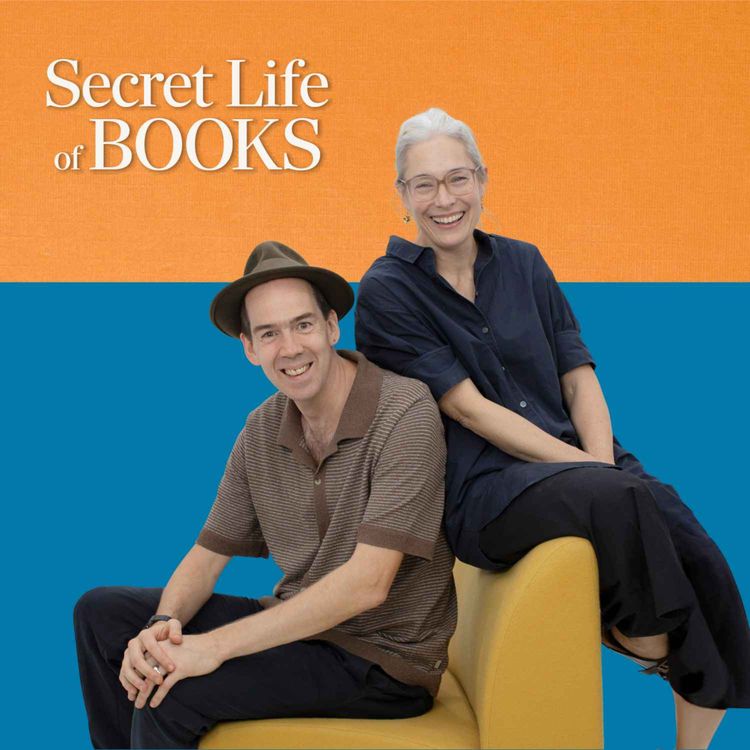
Secret Life of Books
World Poetry Day Double-Bill: Can poetry change the world? The War Poems of Siegfried Sassoon
Together, Siegfried Sassoon’s The Old Huntsman (1917) and Counter-Attack and Other Poems (1918) are among the greatest examples of protest art in British history. Sassoon was a decorated war hero, who took a stand - when few others dared - on the moral emptiness, institutional corruption and brutality of the First World War.
Alongside his poetry, Sassoon took the shocking measure of writing an open letter, which was read out in parliament, in which he accused the British government and military of deception, of deliberately prolonging an ‘evil and unjust’ war, and the complacency of the British public for not holding the government to account.
As a consequence, he faced a court-martial and certain imprisonment, but his friend - the fellow poet Robert Graves - intervened and persuaded the authorities that Sassoon was mentally ill. Instead, Sassoon was sent to Craiglockhart Hospital, under the care of pioneering psychoanalyst WHR Rivers, where he wrote many of his finest poems, before returning to the frontline for the final months of the war.
In this episode, Sophie and Jonty are joined by historian and Sassoon biography Max Egremont, who explains the extraordinary circumstances that led to Sassoon - an officer so brave that his men nicknamed him Mad Jack - turning against the war and embracing the tiny, fringe movement that was pacifism in the 1910s. We’ll find out about his friendships with fellow poet Wilfred Owen and psychologist WHR Rivers at Craiglockhart Military Hospital, which inspired Pat Barker’s best-selling Regeneration trilogy. Finally, the question is asked - can poetry ever change the world?
Siegfried Sassoon: A Biography (2005) by Max Egremont.
Regeneration Trilogy by Pat Barker (1991-1995)
More episodes
View all episodes
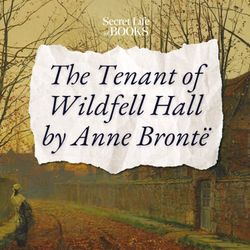
125. The Other Bronte Girl: Anne Bronte's Tenant of Wildfell Hall
01:07:15||Ep. 125With all the fuss and fanfare around Wuthering Heights, we’re worried Emily Bronte is getting more than her fair share of attention. So today we shift the SLOB-light to her younger sister Anne, author of the remarkable The Tenant of Wildfell Hall, published in 1848. Anne wrote it in a whirlwind after the successes of Wuthering Heights and Jane Eyre, determined to prove herself a Bronte in talent and spirit.And though Anne is now the least celebrated of the Bronte trio, Tenant at the time of its publication it was considered the most shocking in the Bronte collective oevre. Anne had fearlessly pulled back the veil on marital infidelity, domestic violence, alcoholism, and the systemic torments of Victorian masculinity and marriage laws.Listeners will spot fascinating overlaps with many of the key scenes and motifs in Emily’s and Charlotte’s writing — like the fact Lord Huntingdon, the violent villain of Tenant, shares his initial with Heathcliff; that he sometimes bears an odd resemblance to Mr. Rochester, and that Wildfell Hall itself has the same initials as Wuthering Heights. But Tenant of Wildfell Hall is also uniquely its own creation, and today Sophie and Jonty get to work unpacking what makes it so extraordinary.To wrap this Bronte mini-series up we ask, should Tenant of Wildfell Hall be classed as peak Bronte, the equal of Wuthering Heights and Jane Eyre? And should Emerald Fennell be making Tenant the next stop on her raunchy, irreverent period adaptation-spree?Become a subscriber by signing up at Apple: http://apple.co/slobOr join our Patreon community here: https://www.patreon.com/c/secretlifeofbookspodcastHosted on Acast. See acast.com/privacy for more information.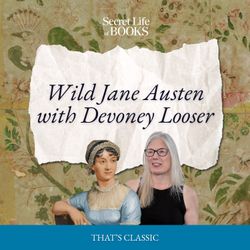
124. Jane Austen's Birthday: why everyone wants to party with Jane
29:39||Ep. 124A special bonus episode about the blockbuster phenom of Jane Austen’s 250th Birthday celebrations. Sophie’s guest is Professor Devoney Looser, one of the world’s leading Austen scholars, and the author of the brilliant Wild for Austen: A Rebellious, Subversive, and Untamed Jane, about the unscripted, occasionally unhinged world that Jane Austen really knew, and which influenced her writing.We talk about why the Austen obsession has only gone from strength to strength, and Devoney looks ahead to Austenmania in 2026, with new screen adaptations coming to delight the fans.Get the Book:Devoney Looser, Wild for Austen: A Rebellious, Subversive, and Untamed Jane, St Martin’s Press, 2025.More fun coverage:From Alexandra Schwartz, a SLOB guest, in the New Yorker: https://www.newyorker.com/newsletter/the-daily/jane-austens-uncommon-compassionhttps://www.nytimes.com/interactive/2025/12/16/books/jane-austen-250th-birthday.htmlListen to our episode about Mrs. Dalloway with Alex Schwartz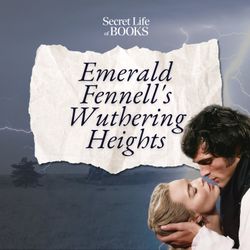
123. Emerald Fennell's "Wuthering Heights": is the hype worth it?
52:40||Ep. 123Best Valentine’s Day ever! SLOB’s “Wuthering Heights” watch-party. Sophie and Jonty take it character by character – inanimate characters included — to decide who are the winners and who are the losers in the Fennell-Robbie-Elordi mash-up adaptation of Emily Bronte’s novel. And in the episode’s gripping second half they move onto the really meaty questions: race, class, sex, domestic violence, and pets.As the movie poster says, Come Undone - with SLOB - this Valentine's season.Become a subscriber by signing up at Apple: http://apple.co/slobOr join our Patreon community here: https://www.patreon.com/c/secretlifeofbookspodcastHosted on Acast. See acast.com/privacy for more information.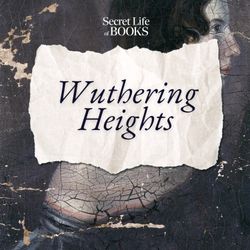
121. Wuthering Heights: Is this really the greatest love story of all time?
01:09:00||Ep. 121The storm clouds are gathering in anticipation of the Valentine’s Day release of Emerald Fennell’s raunchy film adaptation of Emily Bronte’s Wuthering Heights. The film has been described by one critic as “very horny, very sumptuous, and very demented.” Margot Robbie looks set to change the way we read this beloved classic, well, if not forever, for a few weeks during awards season.It’s fair to say that anyone remotely connected to the world of classic literature is standing by, getting ready to jeer.And it’s also fair to say that the film has propelled Wuthering Heights to become the most read classic of 2026. The New York subway, the London Tube and many other transport systems worldwide are dotted with earnest young people, proudly nose-deep in their Penguin Wuthering Heights.If SLOB has a motto, it’s be prepared. To ready our devoted listeners for the big V. Day release, we’ve recorded a brand-new episode on Wuthering Heights. Emily Bronte’s novel, which may just be the most unhinged, genre-busting, unputdownable classic in English, is back, bigger, better, and balmier than when SLOB recorded our first episode back at the very beginning of this podcast.We drink deep, but always with our trademark cheeky humor, in Emily Bronte’s biography, the secrets behind the book’s writing, and why the Heathcliff-Catherine love-story it is most definitely not GOATED, as the kids say.Become a subscriber by signing up at Apple: http://apple.co/slobOr join our Patreon community here: https://www.patreon.com/c/secretlifeofbookspodcastHosted on Acast. See acast.com/privacy for more information.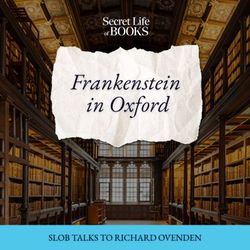
120. Frankenstein in Oxford: A Conversation with Richard Ovenden, OBE
31:36||Ep. 120Sophie talks to Richard Ovenden, OBE, the 25th Bodley’s Librarian at Oxford, about the manuscript of Frankenstein, one of the most extraordinary, and fascinating, literary treasures of all time. Richard is head of Oxford’s Bodleian, as well as the University's libraries, museums, and even botanical gardens. Though Richard isn’t personally dusting off the attic vases or planting the bulbs, he does still spend huge amounts of time with rare books and manuscripts.In this thrilling bonus episode he talks about how the Bodleian came to own the manuscript of Mary Shelley’s Frankenstein, along with the large, fascinating, and often very weird collection gathered from the Shelley family and their friends over several generations.This is an amazing behind-the-scenes look at what goes on in the world’s great libraries, why old books really matter, and why SLOB was right all along that Percy Bysshe Shelley is bad news.To see the manuscript, go to the Digital Bodleian: https://digital.bodleian.ox.ac.uk/objects/53fd0f29-d482-46e1-aa9d-37829b49987d/Become a subscriber by signing up at Apple: http://apple.co/slobOr join our Patreon community here: https://www.patreon.com/c/secretlifeofbookspodcastHosted on Acast. See acast.com/privacy for more information.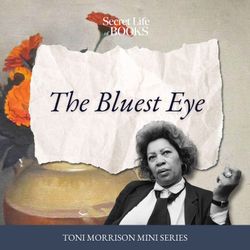
119. Toni Morrison 1: The Bluest Eye
01:09:34||Ep. 119Published in 1970, written by an unknown new writer, The Bluest Eye is the great African American novelist Toni Morrison’s debut. It remains in many ways her most radical. It’s one of the most banned books in America since its publication – for its unflinching, explicit depictions of domestic abuse, racial and sexual violence in small town America. Morrison wrote openly about Black sex and Black violence, challenging the increasingly celebratory tone of American literature in the late 1960s. Reviewing her in the New York Times, the legendary critic John Leonard recognized just how important Morrison’s voice would be. ““The Bluest Eye” is an inquiry into the reasons why beauty gets wasted in this country. The beauty in this case is black; the wasting is done by a cultural engine that seems to have been ‘designed specifically to murder possibilities,” he wrote. “She does it with a prose so precise, so faithful to speech and so charged with pain and wonder that the novel becomes poetry.” Morrison would go on to write many Modernist-inflected literary tours de force, including Song of Solomon and Beloved, and is the first and only Black woman to win the Nobel Prize for Literature. We’ll be taking deep dives into Morrison’s work across four special episodes of SLOB, for Black History Month.Become a subscriber by signing up at Apple: http://apple.co/slobOr join our Patreon community here: https://www.patreon.com/c/secretlifeofbookspodcastHosted on Acast. See acast.com/privacy for more information.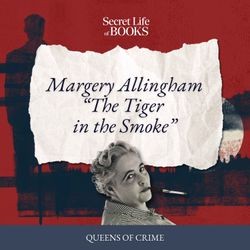
Queens of Crime 4: The Tiger in the Smoke by Margery Allingham
01:06:27|A serial killer on the loose in the foggy, battle-scarred streets of London after the Second World War. Margery Allingham's The Tiger in the Smoke (1952) is Bleak House meets 1984 meets Silence of the Lambs. In this last in the current Queens of Crime series, Sophie and Jonty looks at how Allingham - more, perhaps, than the other Queens of Crime - evolved her craft to suit the changing world around her. She dials back the importance of her aristocratic front-man sleuth Campion (who she first introduced in 1929) to focus more on the grizzled, working-class detective Charlie Luke. This book is a stepping stone out of Christieland into the world of PD James and Ruth Rendell.Become a subscriber by signing up at Apple: http://apple.co/slobOr join our Patreon community here: https://www.patreon.com/c/secretlifeofbookspodcastHosted on Acast. See acast.com/privacy for more information.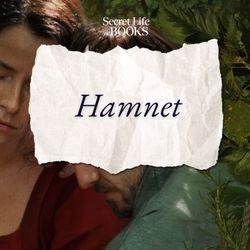
116. To See or Not to See? Hamnet tune-up session
50:07||Ep. 116With the release of Chloe Zhao's rapturously acclaimed film Hamnet, adapted from Maggie O'Farrell's much-loved 2020 novel, SLOB re-releases one of our earliest episodes.Hamnet is a beautiful, lyrical novel about Anne Hathaway, Shakespeare's wife, and the early death of their son, Hamnet. O'Farrell refocussed Shakespeare's story on the women who are usually only glimpsed at the edges of his life, reinventing Anne Hathaway as a vivacious, sexy, creative and compelling full character. In doing so she reimagines Hamlet the play as a mediation on family, love, and loss, organized around Shakespeare's wife.Our Hamnet episode itself is a historical curiosity. #18, in the earliest days of our podcast, it's officially SLOB juvenilia. We've changed and grown in the last year, and we owe everything to our listeners who tell us how it is and how it should be.Please tell us what you think about Hamnet, book or film, by jumping on our Patreon chat: https://www.patreon.com/messages/9473d46b4c7d4e59be6239f82a3e8115?mode=campaign&tab=chatsWhether you plan to see the film or not, this book has stayed in the zeitgeist ever since it was published.Become a subscriber by signing up at Apple: http://apple.co/slobOr join our Patreon community here: https://www.patreon.com/c/secretlifeofbookspodcast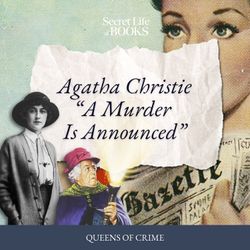
115. Queens of Crime 3: A Murder is Announced by Agatha Christie
01:07:42||Ep. 115A Murder is Announced (1950) was Agatha Christie’s 50th published book. So when better than the 50th anniversary of her death to celebrate one of her greatest works - and introduce Miss Marple into the back SLobalogue? In this third episode in our Queens of Crime series, Sophie and Jonty skip daintily from one side of the Second World War to the other to see if - and how - Agatha Christie’s plots and characters were impacted by the devastation. What we find is an England down-at-heel. Austerity. Rationing. Widespread poverty. Deserters roaming the country. Paranoia and fear of foreigners. When a murder occurs at the (still) charming village of Chipping Cleghorn, the local police are all at sea. The problem is nobody really - truly - knows their neighbours anymore and are people who they say they are? Enter Miss Marple, the Victorian relic with a mind like a sink, to put everything straight - and remind us all that Agatha Christie truly has no peer when it comes to an elegant and rollicking good crime story. Become a subscriber by signing up at Apple: http://apple.co/slobOr join our Patreon community here: https://www.patreon.com/c/secretlifeofbookspodcastHosted on Acast. See acast.com/privacy for more information.